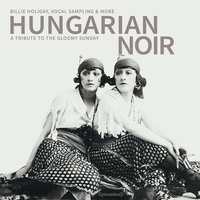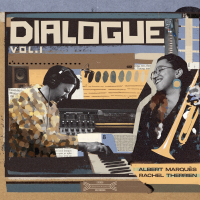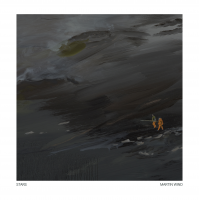Home » Jazz Articles » Album Review » Various Artists: Hungarian Noir
Various Artists: Hungarian Noir
Hungarian Noir is a compilation of diverse variations on the "Gloomy Sunday," theme. The song is covered in several languages by international artists, and undergoes unique instrumental adaptations as well. The English lyrics by Sam M. Lewis are utilized, or loosely translated. No two versions are even remotely similar, the only common thread among them is the nucleus of the song itself, the disparity is obvious and that is exactly what the attraction is.
The record begins with the Cuban acappella group Vocal Sampling, whose lead singer's accented voicing depicts the lost Latin lover. In keeping with the Cuban connection, Manolito Simonet y Su Trabuco perform a danceable instrumental mambo version, and Havana vocalist Glenda Lopez envelopes the song in a charanga rhythm. The mood travels to Mozambique where it undertakes an African/Portuguese transformation with singer Yolanda Chicane joining the group Wazimbo, and Brazilian hip-hop artist GOG gives it a tropical street groove with a rap twist. The American group Matuto present a swaying samba infused rendition, while the Polish superstar Kayah, singing in her native tongue, delivers with an avant-garde dance edge to her Eastern approach. Chango Spasiuk hails from Argentina, and saturates the theme in an acoustical tango infusion, for a deepening forlorn interpretation. Continuing with the South American vibe, the folkloric Colombian band Bambarabanda adds dramatic poetic flairs to the vocalization. Kálmán Balogh and Miklós Lukács are two virtuosos of the cimbalom (Hungarian dulcimer) who formed Cimbalomduo, to honor this traditional and respected instrument. They offer a heart wrenching elucidation, with dark passages depicting authentic sadness and despair.
The definitive Billie Holiday version is featured next to last, and the final track is the Hungarian recording by Pál Kalmár, the first vocal rendition. Both of these singers took this song to widespread audiences, though in different times and languages, back when radio was the established norm of music appreciation. Phonograph records would of course make the song available for the masses, and with the records came the connection to tragedy, as people tended to replay and repeat the song, wrapping the lyrics around their melancholia. There have been many covers of "Gloomy Sunday" in the modern era, though none of them can rival Holiday's for effect and influence. Hungarian Noir is a heroic attempt to shake the song from its depressive association and reveal it as a work of musical art worthy of celebratory recognition, proposing it as a song for the ages.
Track Listing
Gloomy Sunday
Personnel
Various Artists
variousVocal Sampling (1); Wazimbo featuring Kakana (2); Matuto (3); Manolito Simonet y Su Trabuco (4); Kayah (5); Gog featuring Pianola (6); Glenda Lopez (7); Chango Spasiuk (8); Bambarabanda (9); Cimbalomduo (10); Billie Holiday (11); Pál Kalmár (12).
Album information
Title: Hungarian Noir | Year Released: 2016 | Record Label: Piranha
Tags
PREVIOUS / NEXT
Various Artists Concerts
Support All About Jazz
 All About Jazz has been a pillar of jazz since 1995, championing it as an art form and, more importantly, supporting the musicians who make it. Our enduring commitment has made "AAJ" one of the most culturally important websites of its kind, read by hundreds of thousands of fans, musicians and industry figures every month.
All About Jazz has been a pillar of jazz since 1995, championing it as an art form and, more importantly, supporting the musicians who make it. Our enduring commitment has made "AAJ" one of the most culturally important websites of its kind, read by hundreds of thousands of fans, musicians and industry figures every month.






















